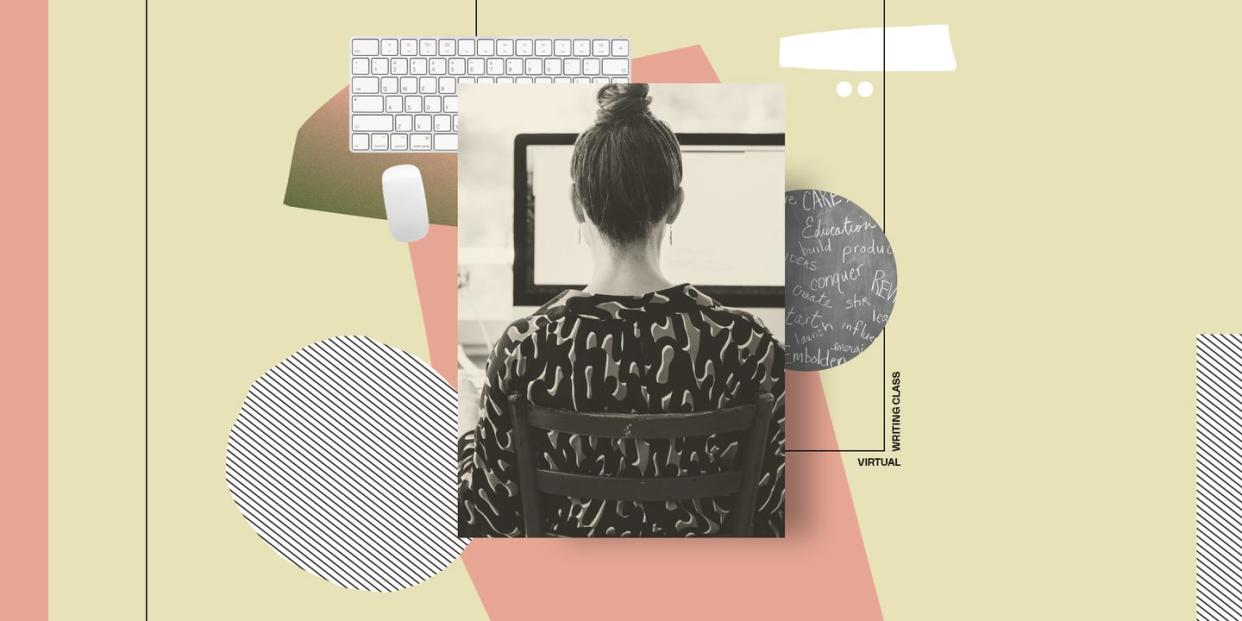The Surprising Silver Lining of Online Teaching

I had been a college writing professor for twenty-five years when the coronavirus forced us online in March of 2020. I feared the intimacy of crafting and reading aloud first-person essays wouldn’t translate digitally and never had my technophobia seemed more justified. At my first online class, I was greeted by an image of a Barbie instead of my student's face. I was Zoom bombed with techno music and once was kicked off my own class for 16 minutes.
Within weeks of the initial shutdown, I was heartbroken to see my Manhattan undergrad and graduate students suddenly sick with no medical insurance, thrown out of their dorm rooms, and fighting to return to their homes during chaotic airport bans with ever-changing rules. They had paid tuition and needed the credits to get their degrees. Technophobic or not, I decided I wouldn’t let them down. I dressed up, did my hair and makeup, and commuted to my living room.
Usually, our class goal was to write and sell a great piece by the last session. My signature assignment to find literary gold fast was to ask for “three pages confessing your most humiliating secret.” I promised my students that writing was a way to turn their worst traumas into the most beautiful art. Now that visiting editors wanted essays about how people were surviving the virus, we turned to the pain of the pandemic. “I got COVID twice but nobody cares,” a student threw out. “Anti-Asian violence makes me afraid to go outside,” said another. Another student, a Michigan teacher born with a deformed jaw, admitted she preferred wearing a mask because it made her less self-conscious. A gay student confessed he’d been the victim of homophobia, xenophobia and food insecurity.
These tales soon became poignant published pieces, transforming obstacles into small triumphs we shared on Facebook, Twitter and LinkedIn. As spring and summer courses remained virtual, I received emails from current and former students in distress whom I’d kept in touch with, as well as social media friends, fans and followers wanting guidance. The vulnerable essays I’d posted inspired others to share their own struggles. A 17-year-old whose uncle died from COVID worried about finishing high school on his computer in his family’s cramped West Coast apartment. After suffering a miscarriage, a woman in England dreaded subpar healthcare women of color like her received. A mom in Queens with complications from post-mastectomy implants had her corrective surgery postponed. Another was put off by newspaper and magazine articles blaming people of color for not getting vaccinated. A North Carolina mom was petrified that the social isolation was making her 8-year-old suicidal. A single dad in Pennsylvania tried to help his 89-year-old British Indian mum through a medical crisis 3,500 miles away.
At the university where I taught, I was only allowed seats for the twenty pupils officially enrolled. But as computer courses became commonplace, I launched private Zoom classes on my own, where I could fit in many more faces, and it was my choice who was invited. The global medical emergency had at first made me feel powerless. During Black Lives Matter protests and waves of anti-Asian and anti-Semitic harassment, I’d been unsure how to be an ally. Now I could welcome hundreds of pupils who couldn’t afford tuition to audit my courses for free. Those who were disabled or who had commuting and childcare issues could participate more easily. Seeing inside each other’s homes added comedy and transparency.
I made exceptions for odd-hour emails, texts, or calls when an editor’s interest meant a debut clip in a national paper and $500 for someone who’d been out of work for a year. With no geographic limitations, more publishing luminaries across the country could join our teleconferenced sessions. Class rosters previously filled with mostly white Manhattanites became beautifully multicultural. Writers in Vietnam, Malaysia, Hong Kong, and India woke up at 6 a.m. to log on while night owls from Italy, France, Brussels, and Egypt stayed up past midnight.
With fresh New York Times and Washington Post bylines, the California high-schooler was offered and accepted a full scholarship to Stanford University. The masked Michigan teacher sold her debut novel. A single mother exposing the racism she’d suffered in America landed a six-figure memoir to Penguin Random House and dazzled at e-book events we did together. In a form of gratitude that teachers treasure but rarely get, three students thanked me with articles about my online teaching.
To encourage my students, I’ve often quoted my addiction therapist who told me: "to stay happy and healthy, you should lead the least secretive life you can.” Zooming into my classroom I learned that sharing our struggles is still the best way to fight isolation and uncertainty.
While the health crisis continues to loom, I’ll keep my focus on my laptop’s silver lining. I’m grateful for this fascinating window connecting me to the outside world.
You Might Also Like
